
Posts Tagged ‘JPMC’
JPMC introduces organ transplant in 2019
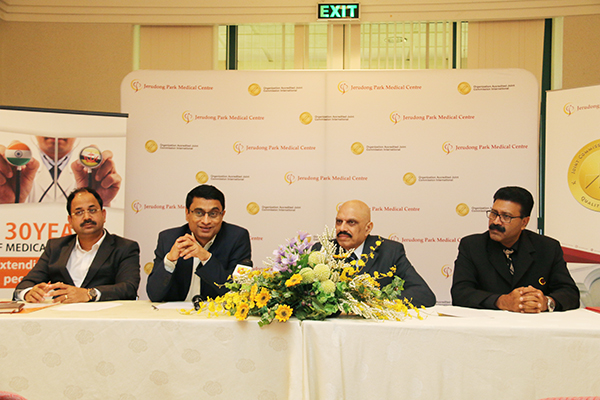
Mr. Santosh Kumar Sahoo, General Manager of Yashoda Hospital, Dr. (Prof) Balachandran Menon, Director of Liver Transplant of Yashoda Institute of Liver Transplant & Hepatobiliary Diseases, Dr. Kabeer Meera Saheeb, Medical Director of Jerudong Park Medical Centre and Mr. Varghese Paulose, Chief Operating Officer of Jerudong Park Medical Centre during the press conference on establishing organ transplant around in Borneo region
It is a great movement to announce, living donor liver transplantation facility is soon made available in Brunei Darussalam through Jerudong Park Medical Centre (JPMC) and Yashoda Hospitals, India.
As we all know Yashoda Hospitals is with one of best track record for best organ transplant program and since three decades, Yashoda Group of Hospitals has evolved as a centre of excellence in medicine providing the highest quality standards of medical treatment to patients.
“This partnership will further improve the quality and effectiveness of health care for all Bruneians and make Brunei Darussalam among one of the medical tourism destination for quality patient care, we are committed to provide an optimal treatment and to ensure that all our patients have the most pleasant stay possible at JPMC.” said Mr. Varghese Paulose, Chief Operating Officer of JPMC. “JPMC provides the most effective health care services, as well as individual attention and personal dedication from doctors and staff who foster patient’s confidence and hope.” he added.
“This joint medical partnership will bring a team of highly trained specialists with many decades of combined experience and continues a tradition of excellence with leading-edge health care capabilities, a team of experienced professionals, a team approach to patient care designed for your comfort, hope and most important of all, healing.” said Dr. Kabeer Meera Saheeb, Medical Director of JPMC. “This joint venture involves local medical and nursing personals. There will be technology transfer over 5 years for the advancements of surgical intensive care, radiological and laboratory services.” added Dr. Kabeer.
The Liver Transplant facility at JPMC, the clinical pathway jointly offers by Yashoda Group of Hospitals, India and JPMC.
Ministry of Health, Brunei Darussalam will be involved actively in pre-operative evaluation and screening for liver transplants and post-operative management to improve health for successful liver transplant outcomes.
The doctors from Yashoda Hospital, Jerudong Park Medical Centre and RIPAS hospital coordinates the care for optimal pre and post-operative treatment.
To support the transplant care, JPMC will have a transplant coordinator who will work closely with doctors, patients, relative and donor throughout transplant care.
“Adult patients with end-stage liver diseases such as liver cirrhosis, liver cancer and acute fulminant hepatic failures and pediatric patients with congenital liver cirrhosis, biliary atresia, and metabolic liver diseases are all indications for liver transplantation. Whether or not recipients are good candidates for liver transplantation is determined by examining and analyzing each patient’s medical condition and characteristics.” said Dr. (Prof) Balachandran Menon, Director of Liver Transplant of Yashoda Institute of Liver Transplant & Hepatobiliary Diseases.
Dr Balachandran highlighted, “The liver is an organ that can be transplanted in part or in whole. Patients can receive a portion of the liver from family members. The donor’s remaining liver regenerates, allowing for the donor to lead a normal healthy life without risks. A donor and recipient must be of similar build and should have compatible blood types, and possibility for donation is determined after thorough examinations. A donor whose liver functions are normal and healthy is qualified as a donor candidate as long as the liver is without illness, infection and cancer.”
How long the patient’s need to be hospitalized
Patients will stay in the hospital for around three to five weeks after liver transplantation and will have regular outpatient visits after discharge. To prevent complications of organ transplantation, all patients must take an immunosuppressant drug every day.
My thoughts:
It’s pretty cool to see JPMC offering such services which will kick off hopefully in the first quarter of 2019. The specalists from Yashoda Group of Hospitals saw the opportunity to collaborate with JPMC and this will also help to bring international patients to Brunei waters which provides a great environment especially for recovery. It was also mentioned that the liver donor is ideally between the age of 18 to 50.
Did you know that our liver even cut in half can still grow in a whole liver overtime? Interesting. So it makes sense why liver can be transplanted to another person just as long as the liver has no complications.
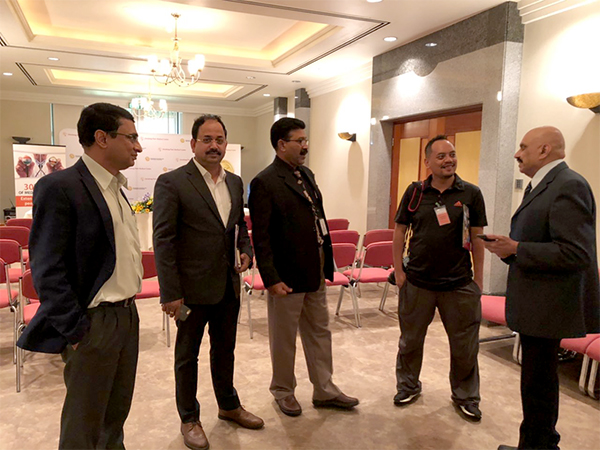
Mingling with the doctors
Successful blood clot removal
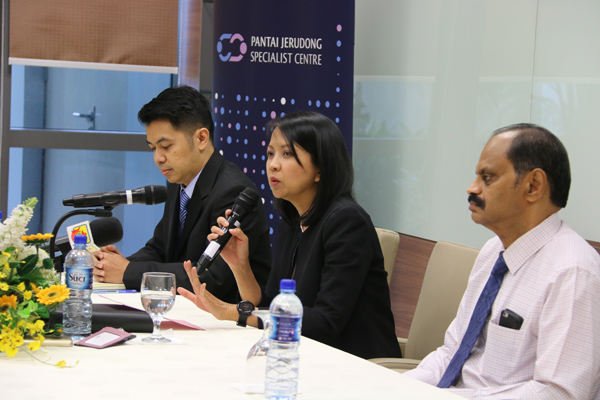
Dr Dk Siti Nur’Ashikin Pg DP Hj Tengah, Director of Brunei Neuroscience Stroke & Rehabilitation Centre and a Consultant Neurologist speaking to the media during the press conference last Friday at Pantai Jerudong Special Centre
The 13th July 2018 marks the historic occasion of the first mechanical thrombectomy (clot removal) for stroke to be successfully executed in Brunei. The procedure was carried out on a 33-year-old male patient, Mr Hii Hin Chung, in a collaborative effort between the Brunei Neuroscience Stroke & Rehabilitation Centre (BNSRC) and the Radiology Department of the Raja Isteri Pengiran Anak Saleha Hospital, Ministry of Health.
Stroke occurs as a result of lack of blood flow to an area of the brain either due to a blockage from a clot (ischaemic stroke) or through bleeding into the brain (haemorrhagic stroke). The main risk factors for stroke are high blood pressure (hypertension), high cholesterol, diabetes mellitus, smoking and family history.
Stroke (or cerebrovascular diseases) has been recorded as the 4th leading cause of death in Brunei Darussalam (after cancer, heart disease and diabetes mellitus) from 2012-2016 according to national health statistics published by the Ministry of Health. In 2016, stroke accounted for 7.5% of all deaths in the country. However perhaps of even greater significance is the impact caused by disability as a result of the stroke. This could include weakness of limbs, loss or impairment of speech. The resultant disability is evident in the burden of care as well as loss of employment/income either through having the stoke or being the stroke carer.
According to the Director of BNSRC, Dr Dk Siti Nur’Ashikin Pg DP Hj Tengah who is also a Consultant Neurologist, “… the impact of stroke not just on the individual but also the community should be taken very seriously …. Whilst we always advocate for stroke prevention, once a stroke has happened, I urge patients to attend hospital Emergency Department as soon as possible because the faster we are able to treat a stroke the more likely our treatment will be effective ….. Treatment decisions do depend on stroke type but thrombectomy offers an exciting, new option for stroke treatment that can significantly reduce not just death but also disability.”
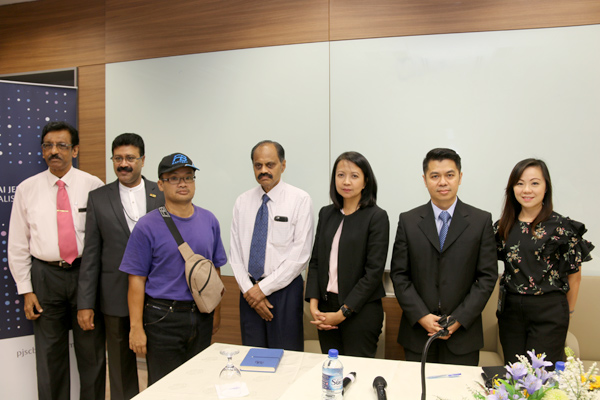
Mr Hii Hin Chung (3rd from left) went through a clot removal procedure
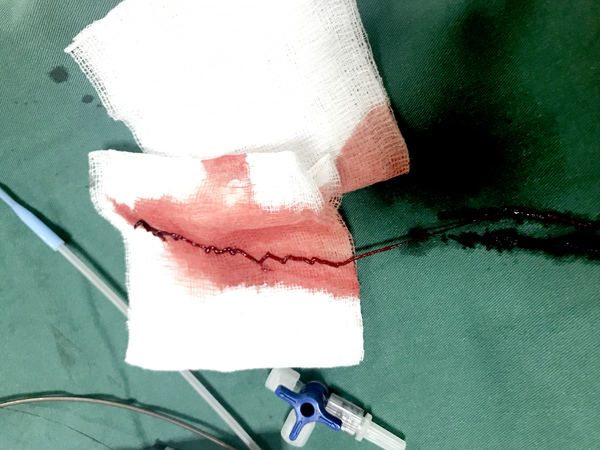
Image of the blood clot of the patient that was removed
Mr Hii, a car parts salesman, was discovered at 2.30pm on 13th July 2018 by work colleagues and found to have left-sided weakness. He was brought to the Raja Isteri Pengiran Anak Saleha Hospital by ambulance and was subsequently transferred to BNSRC where scans confirmed a stroke on the right side of his brain. Clot-busting treatment (thrombolysis) was given with good effect initially however there was concern that his brain scan showed a blockage to blood flow. The patient was escorted to RIPAS Hospital by Dr Chan Guan Choon, Neurology Medical Officer at BNSRC who reported that Mr Hii’s speech was slurred and his left arm and leg were both weak.
At the Raja Isteri Pengiran Anak Saleha Hospital Mr Hii underwent angiography carried out by Dr Sankarakumar Sambandamurthy, Consultant Radiologist, assisted by Dr Lim Kian Chai, Consultant Radiologist and Head of the Department of Radiology. They identified a long clot which they were able to extract using a special suction device.
Mr Hii was then transferred back to BNSRC where he was monitored initially on the Neuro-Intensive Care Unit before being moved to the Neurology Ward for further treatment and rehabilitation. Mr Hii made a good recovery and on discharge he was able to manipulate objects with his left hand well and was able to walk independently. He continues to have outpatient rehabilitation and will be followed up in the Neurology Clinic.
The Director of BNSRC, Dr Dk Siti Nur’Ashikin Pg DP Hj Tengah went on to say “This is a great example of successful stroke treatment through early action, skilled workforce and good cooperation between healthcare institutions in Brunei Darussalam …. we are extremely grateful to the Government of His Majesty, the Sultan and Yang Di-Pertuan Negara Brunei Darussalam for supporting such endeavours that directly benefit patients needing treatment for stroke”.
BNSRC and the Ministry of Health continue to work closely together in efforts to combat stroke and later this year plan to launch a campaign targeted at stroke prevention as well as treating stroke early.
Key messages:
1. You can reduce your risk of stroke by stopping smoking and by having your blood pressure, sugar and cholesterol checked and treated if the levels are high.
2. Stroke is largely treatable — but you have to get help fast. If you spot F(ace drooping), A(rm weakness) or S(peech difficulty), it’s T(ime to call 991). To learn more about the warning signs of stroke, visit StrokeAssociation.org
PJSC makes headway in radiotherapy field
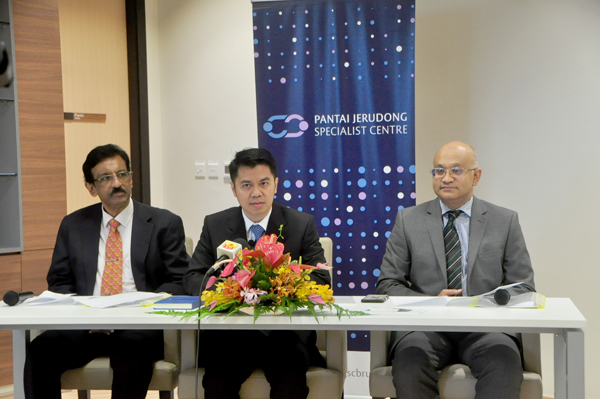
Dato Seri Laila Jasa Dr Babu Sukumaran, Medical Director of Pantai Jerudong Specialist Centre (PJSC) cum Director of The Brunei Cancer Centre, Dr Mazrul Adimin bin Hj Awg Besar, Executive Director of PJSC and Dr Jamsari bin Khalid, Consultant Radiation Oncologist and Head of Radiotherapy Department during the press conference for surgical advancement and radiotherapy service at PJSC
Pantai Jerudong Specialist Centre (PJSC) opened its doors to the media representatives across Brunei to speak on the latest surgical advancement in the field of radiotherapy this morning.
Chaired by the Executive Director of PJSC, Dr Mazrul Adimin bin Hj Awg Besar, the other members of the panel were Dato Seri Laila Jasa Dr Babu Sukumaran, Medical Director of PJSC cum Director of The Brunei Cancer Centre and Dr Jamsari bin Khalid, Consultant Radiation Oncologist and Head of Radiotherapy Department.
Also in attendance were Mr Varghese Paulose, the Chief Operating Officer of PJSC and Ms Vivian Tie, Hospital Administrator of PJSC and other staff members.
During the press conference, members of panel highlighted on the latest development and services provided by the Radiotherapy Department. Under the purview of The Brunei Cancer Centre (TBCC) at PJSC, they expressed their pride in making headway in the field of Stereotactic Radiosurgery (SRS) and Stereotactic Body Radiotherapy (SBRT). In brief, both the SRS and SBRT treatment are non-surgical ablative radiation used to treat tumours of the brain that is not accessible when conducting open surgery. In comparison to traditional radiation therapy, it delivers precisely-targeted radiation in fewer high-dose treatments than traditional therapy without affecting the surrounding healthy tissue.
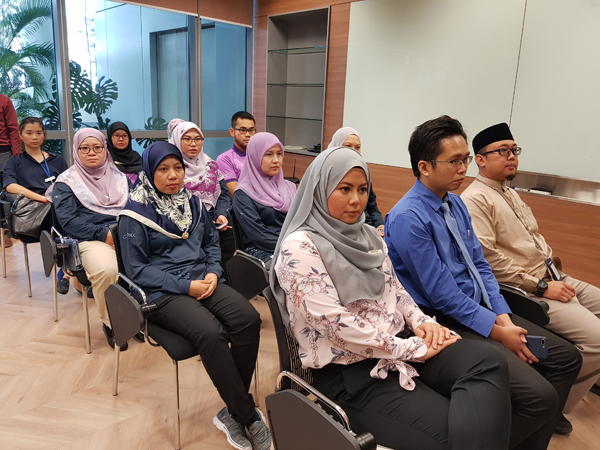
Invited guests and media during the press conference
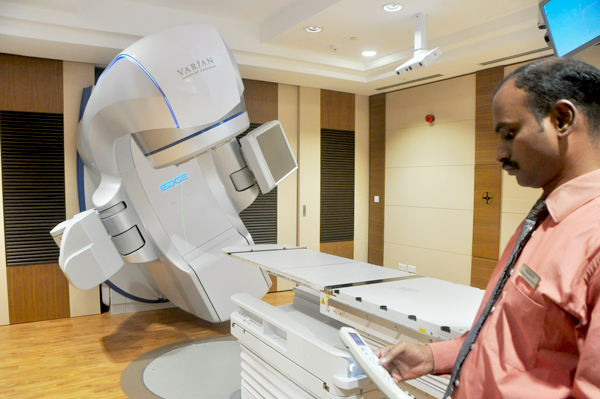
The new advanced Varian Edge which conducts radio surgical treatment that is frameless, non-invasive, fast and accurate
The radiotherapy department started functioning in 2016, where highly skilled clinical team have utilised highly advanced equipment and tailor-made techniques to treat specific cancer diseases. To date, they have treated more than 600 cases ever since it opened.
Armed with two new state-of-art linear accelerators namely the Varian Trubeam and Varian Edge, brachytherapy equipment, a CT-simulator and 3D treatment planning system, the department also conducts radio surgical treatment that is frameless, non-invasive, fast and accurate. In the past, it would have taken more than 2 hours to deliver treatment to the patient, however with the new technology provided at PJSC, treatment normally 5-10 mins.
The panel also elaborated on the recent referral case conducted by the radiotherapy clinical team as the team now embarks on handling their first few paediatric cases.
Amongst others, TBCC’sradiotherapy servicesincludesthe Image Guided Radiotherapy (IGRT), Volumetric Intensity Modulated Arc Therapy (Rapid Arc) and Conventional and 3-D conformal radiotherapy. Due to these advancement, number of patient cases sent overseas to get treatment has tremendously dropped. PJSC prides in providing a facility fully equipped to provide the best cancer care to the citizens of Brunei Darussalam. This is also in line with the vision and mission of the centre in working together to lead a specialized medical centre that provides the highest standard of healthcare practices.
Pantai Jerudong Specialist Centre (PJSC) is a specialized medical centre situated in Jerudong. It consists primarily of three centres of excellence namely The Brunei Cancer Centre (TBCC), Brunei Neuroscience Stroke and Rehabilitation Centre (BNSRC) and Maxillofacial, Facial Plastic and Reconstructive Surgery Centre (MFPRSC).
Video winners

The top 3 winners of the The Jerudong Park Medical Centre (JPMC) Video Contest
The Jerudong Park Medical Centre (JPMC) Video Contest prize presentation ceremony was held earlier today, 19th January 2018 at JPMC CME Room. The video contest gave the opportunity to the local creative industry to showcase individual talents.
The video contest had over 30 entries featuring three categories to choose from; In-Vitro Fertilization, Health Screening and Varicose Vein. With efforts, passion and creative skills of these participants, were entitled to the grand prize carries a cash prize of BND5,000, BND3,000 for 2nd place and lastly BND1,000 for 3rd place.
A prize presentation was held for six lucky winners presented by Chris Carvalho, Hospital Administrator of The Jerudong Park Medical Centre.
A cheque presentation worth BND5,000 was presented to Anas Afandi Bin Haji Md Hussain and Siti Seri Leila Imelda Farah Zohre Binti Haji Abdullah who won 1st place in their respective categories. The prize worth BND3,000 were given to Mohammad Suhardy Bin Haji Hambali and Adam Groves who were in 2nd place, and the 3rd place prize worth BND1,000 were given to Mohammad Solehin Bin Haji Masri and Siti Nurfaziraah Binti Abdul Manaf.
During the 14th China Asean Expo (CAEXPO) held in Nanning, Guangxi China last September, the videos were part of the promotion on health services in The Jerudong Park Medical Centre. Images courtesy of @jpmcbrunei
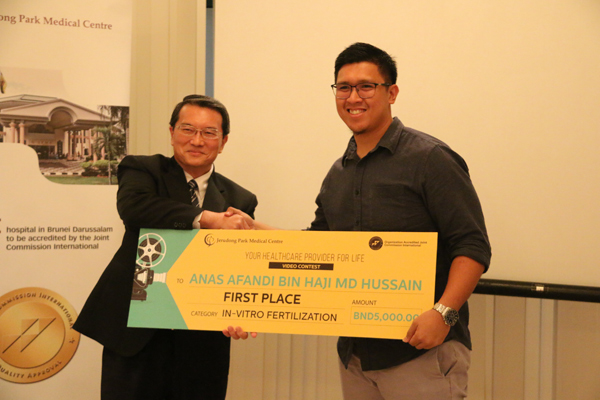
Anas Afandi Bin Haji Md Hussain won first place in the In-Vitro Fertilization category, receiving from Chris Carvalho, Hospital Administrator of The Jerudong Park Medical Centre

